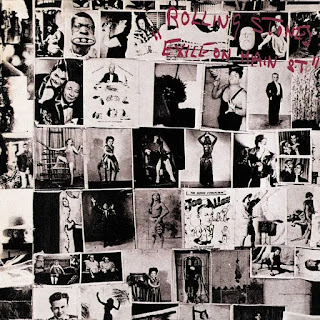"What's your favorite album?," my sister asked me once.
"Exile on Main Street, I guess," I said.
"No, I mean, what's your actual favorite album, not the album you say when people ask you what your favorite album is," she replied.
I don't know, I've probably toyed around with this being my favorite album from time to time. It's at least in my top 10. And why not? It's practically a greatest hits collection all in one place. "Tumbling Dice," "Rip this Joint," "Rocks Off," "Shine a Light," "Sweet Virginia," I mean, come the fuck on. It's more or less the creative apex of the Glimmer Twins', Mick Jagger and Keith Richards, rock songwriting. Later albums in the 70s saw the band experimenting with other genres, largely at Jagger's direction, as Richards' heroin habit made him a difficult collaborator.
Although it sounds like this album was recorded at least partly in Muscle Shoals like its predecessor, it was in fact tracked at Keef's tax-haven chateau in the South of France. Members of the band would gather from about 8 in the evening until early the next morning to work on it; these hours often depended on Richards' heroin schedule. But while the setting may have been the Côte d'Azur, the sound is pure Americana, a kind of swamp boogie/bar band/shaggy blues that the Stones spent this album and Sticky Fingers perfecting. The Stones started with a love for American blues, and as the band developed, they used it as a jumping-off point, molding it to suit their needs.
Structurally, the double album feels like a party at first, followed by the crash and the inevitable reckoning. Side one, track two, "Rip This Joint:"
From San Jose down to Santa Fe
Kiss me quick, baby, won'tcha make my day
Down to New Orleans with the Dixie Dean
Across to Dallas, Texas with the Butter Queen
Rip this joint, gonna rip yours too
Some brand new steps and some weight to lose
Gonna roll this joint, gonna get down low
'Round and 'round and 'round we'll go
The music is pure roadhouse, with a rolling piano and bleating horns to go with Richards' chugging guitar and Jagger's snarl. "Tumbling Dice," one of several songs using gambling as a metaphor for debauchery, is so sweetly melodical and catchy it's hard to reconcile with its message, which is all these chicks are running me ragged! It's followed by "Sweet Virginia," a heavily country-infliuenced song (inspired, so they say, by Gram Parsons' presence around the band), about doing too much drugs. I mean, write what you know, right?
The first song on side 3 is one of my very favorite Stones songs, an absolute dark horse, "Happy," one of the few songs sung by Richards. It starts with that immediatrely recognizable riff and drums and Keith's strangled cry:
Well, I never kept a dollar past sunset
It always burned a hole in my pants
Never made a school mama happy
Never blew a second chance, oh no
I need a love to keep me happy
I need a love to keep me happy
The song famously emerged when Richards was the only band member who showed up for a session, along with producer Jimmy Miller and sax player Buddy Keys. According to Richards, he came up with the riff and the whole thing was done in four hours. Jesus Christ. It's an absolute blast of a song, as joyous as the title suggests. It's followed by another rave-up, "Turd on the Run," one of the worst song titles in rock history, especially for such a great jam. (It's basically an extended poop joke, but we'll let it slide.)
By the end of side 3, the party's over and it's time for the hangover. Starting with "I Just Want to See His Face," the record takes a dark, inward turn as the band begins to grapple with the fallout of unlimited drugs and sex in the South of France. Side 4 has only four songs, and one is a cover, "Stop Breaking Down," originally by Robert Johnson in 1937. The last two songs really close it up, "Shine a Light," which is a heartbreaking tale of a broken man (widely believed to be Brian Jones) that builds like a gospel anthem, with the legendary Billy Preston on piano and organ, the instruments which really drive the song. The album closes with "Soul Survivor," really to be honest not one of the best songs on this album but which puts a bow on it ("Where you are, I won't be/You're going to be the death of me").
The Stones' famous decline in the 70s started after this album, which was followed by the mostly forgettable Goats Head Soup and then Black and Blue, after Mick Taylor quit and the band more or less bottomed out. But for this shining moment, everything converged in just the right way and one of the greatest bands in rock history produced what is surely one of the greatest albums. I'm still not sure it's my favorite album, but I'm happy saying it could be.
Is this album in my personal Top 100? Yes, yes, yes.




Comments
Post a Comment